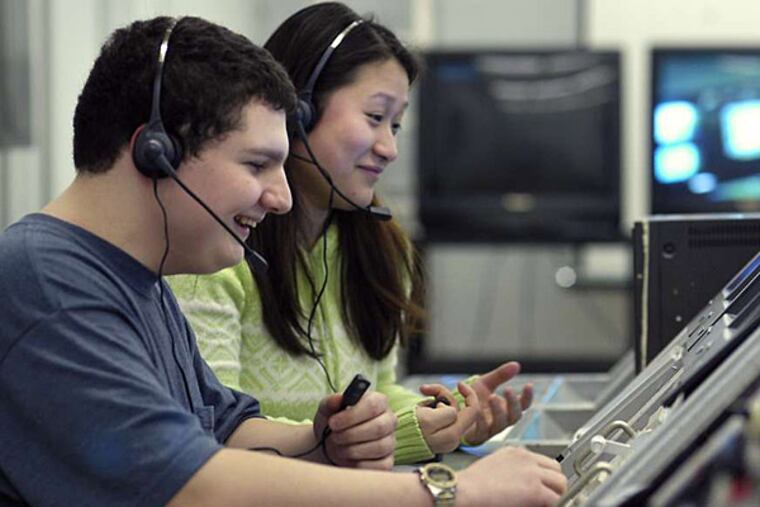Budget cuts kill acclaimed space program for students at Northeast High
For 50 years, Northeast High School students have taken part in sophisticated simulated space missions that halted asteroids speeding toward Earth, repaired satellites, and landed on the moon.

For 50 years, Northeast High School students have taken part in sophisticated simulated space missions that halted asteroids speeding toward Earth, repaired satellites, and landed on the moon.
That era is over.
Last week, the nationally acclaimed Space Research Center after-school program - and dozens of other academic clubs - were eliminated, yet more victims of the Philadelphia School District's ongoing budget cuts.
"It's really, really unfortunate," Northeast junior Leon Frame said. He was an astronaut this month on the program's final mission.
The Space Research Center program, known as SPARC, was just one of dozens of extracurricular activities dropped at Northeast because of fiscal pressures. Debate, dance, Science Olympiad, and other clubs also were cut.
Sports are funded by the district's central office and were not affected.
The academic clubs had operated with no budget since September, principal Linda Carroll said, and teachers volunteered in the hope money could be found to keep activities going.
But recently, "the people who have been running things said, 'As much as we want to do it, we can't,' " Carroll said. "I don't fault them. People get tired of being disrespected. They bank on our passion."
Carroll hopes to restore the clubs, and laments their loss.
"I feel so badly," she said. "The kids are the ones who are suffering."
The space program, which had 120 student participants this year, has a rich history.
In the early 1960s, at the height of the space race, physics teacher Robert A.G. Montgomery launched it to pique students' interest when the United States was in a frenzy to beef up science education. Early flight simulations happened on the auditorium stage, with a rudimentary capsule made of lumber.
NASA donated money early on, and it recognized the program on multiple occasions. Northeast's Medical, Engineering and Aerospace magnet program - which still exists - began because of it.
Eventually, a separate wing was built for the after-school club and the magnet program, with elaborate capsules built on site.
Several NASA astronauts have visited the program, and one of them, Philadelphia native Chris Ferguson, was honorary flight director and teleconferenced with students in 2007 and 2008.
Students studied engineering, robotics, computer science, and trained in CPR and first aid. Their work culminated every year in a two-day simulated space mission that required months of planning.
Funding the program has been a continual problem, said retired teacher Anthony Matarazzo, who served as its director from 1991 to 2005.
"They almost did away with it for the last few years," Matarazzo said. "They did flights, but teachers were volunteering. Each year, there was a little less."
The loss of the space program is a loss for Philadelphia, Matarazzo said. It drew students from across the city.
"It was a marvelous program. The kids who went through this program have become unbelievable assets to this country," he said. Alumni include engineers, professors, surgeons, computer scientists, and others.
Senior Jeremy Cruz, one of the program's managers, was crestfallen at the news of its elimination, news he had to deliver to his classmates in an emotional meeting last week.
"We were heartbroken, all of us, even the teachers," Cruz said.
He and others are frustrated that academic clubs were cut but athletics remain, and they have vowed to fight.
"We were angry. We were sad. But we weren't just going to take this sitting down," Cruz said.
Students have reached out to Mayor Nutter and others in the hope someone can help. Cruz estimated it would take several thousand dollars to restore the program.
Cruz's mother, Lisa Maldonado, knows what the space research program has done for her son. He's not into sports, but this activity gave him a chance to shine.
"This teaches them about teamwork, and they loved doing it - they loved the flights, everything," Maldonado said. "To take this away from them is such a shame."
The loss of the space program is a symptom of a larger problem. Systemwide, massive money troubles have stripped schools of staff, programs, and services. Many schools have not run clubs this year.
At Northeast, the city's largest school with more than 3,000 pupils, things are so dire there was no cash to pay for batteries for students' calculators. A fund-raiser was held to drum up the $1,600 needed to keep the calculators powered.
Principal Carroll knows what losing the space program and other clubs means.
"If you want children to get a quality education, you can't just talk about it - you have to back it up," she said. "We want to keep their interest, but we just don't have the funding for these extracurriculars."
215-854-5146 @newskag